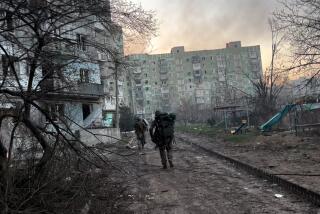For Eager Soldiers, a Weighty Realization: ‘Life Is Fragile’
- Share via
NORTH OF NAJAF, Iraq — At age 19, Spc. Jamie Gandy had been full of youthful bravado as he rode into the heartland of Iraq. After months of waiting in Kuwait, he was ready and eager to bring the battle to Saddam Hussein.
By Monday, he had learned a lesson that is taught to every generation of soldier: Bravado will get you only so far.
For the record:
12:00 a.m. May 14, 2003 For The Record
Los Angeles Times Wednesday May 14, 2003 Home Edition Main News Part A Page 2 1 inches; 37 words Type of Material: Correction
Cyclone Company -- A March 25 article on the entry into battle in Iraq by the Cyclone Company of the U.S. Army’s 2nd “Spartan” Brigade, 3rd Infantry Division, misspelled the name of Pvt. David Balicki as Bilicki.
“I feel we’re actually facing a real enemy now,” said Gandy, of Adel, Ga., one of a team of forward observers for Cyclone Company of the Army’s 2nd “Spartan” Brigade, 3rd Infantry Division. “Some mortar rounds landing close to your position will make you feel life is fragile.”
Spread out on a high desert plain on the northernmost part of the front, this armored company awaits with a newfound sobriety an almost certain engagement with some of the most hardened and dedicated forces supporting Hussein: the Medina Division of the Republican Guard, three brigades strong, with tanks and advanced equipment that can put up a real fight.
In a stinging taste of the battle that awaits, Iraq sent a column of 30 armored vehicles south toward the Karbala Gap, a key choke point standing between U.S. forces and Baghdad. Air support pushed it back, destroying 10 tanks and a few other vehicles, local commanders reported Monday. One U.S. soldier was reported killed by sniper fire near the company’s position.
The fighting followed a tense Sunday night during which the company, along with several others from the 4th Battalion, 64th Armored Regiment, was harassed by mortar fire and small bands of lightly armed militia creeping out of Najaf across the broad, muddy fields along the Euphrates River.
Several rounds landed within 50 yards of the company’s vehicles, close enough to hear the whistle as they approached and exploded with a ground-shaking boom.
“The first 48 hours was very motivating, but after last night, it makes you realize how lucky you really are,” said Sgt. Luther Robinson, a medic with Cyclone Company.
The generals insist that the war is proceeding according to plan, right on schedule. But after Iraq captured and killed several American soldiers, and after Iraqi forces put up deadly resistance, some of the men on the ground wonder.
Pvt. David Bilicki, a 19-year-old Pittsburgh native who joined “to get my life started” and to set the stage for marrying his fiancee, now just wants to come home alive. “I’m an idiot. I should’ve been a medic in the Air Force, like my mother,” Bilicki said. Instead, he zips around the desert in a lightly armored vehicle spotting the enemy and calling for fire at the leading edge of the company.
“If I walk out of this, it’ll be a good experience to talk about,” Bilicki said. “They were positive we wouldn’t have contact [with enemy forces] until Karbala. We had contact all the way up, as it turns out. You saw burned-out vehicles the whole way.”
As a result, the predicted pace of this assault has slowed. Cyclone Company and the whole 2nd Brigade were stopped short of the Karbala Gap on Monday as other elements of the brigade fought to secure key river crossings.
“The only thing we didn’t expect was the fanatics at Najaf,” said Capt. Steven Barry, the company commander. “But within three days, we’ve moved to within the area we want to be. We’re in his backyard. I think the more we pound at the government and hit Baghdad, the more they’ll wither on the vine.”
For the first time, one of Cyclone’s platoons fired its heavy tank guns and .50-caliber machine guns during the previous night’s mortar harassment. At least two enemy soldiers were killed, Barry said.
“One special forces guy said to me it’s like clearing your throat to get ready for the fight,” he added. “I think it was good for the platoon that fired last night to shake the jitters out.”
As night fell, it was clear that the jitters were alive and well as troops hunkered down, kept their lights dimmed and listened to the distant booms of a fight that soon will be theirs.
More to Read
Sign up for Essential California
The most important California stories and recommendations in your inbox every morning.
You may occasionally receive promotional content from the Los Angeles Times.














